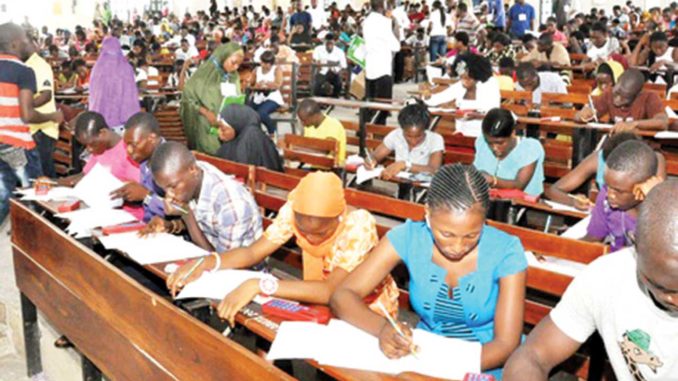
It was the late icon of anti-apartheid struggle and former South African President Nelson Mandela who observed that “education is the weapon you can use to change the world.” Most countries invest more in education than in any other part of the economy because education is the basis of everything in a society.
The United States budgeted $59 billion discretionary appropriations for the Department of Education in 2018, including $1.4 billion to support new investments in public and private school choice. The Ghanaian government dedicates one-third of its total national budget to education. But the Nigerian government allocates only seven per cent of its budget to education which is far below the 26 per cent recommended by the United Nations. A government that is not interested in education is out to destroy its nation.
It is about seven weeks now that the Academic Staff Union of Universities (ASUU) has been on an industrial action over the failure of the Federal Government to implement the 2009 agreement signed with the union. It is very scandalous and ridiculous that for almost a decade, the government of a nation cannot implement what it negotiated with a union.
To further show the disinterest of Nigerian leaders in education especially at the tertiary level, and the magnanimity of the ASUU, a memorandum of understanding was signed after a protracted strike by the union in 2013 which not only lasted for six months but which claimed the life of one of the veterans of ASUU, Prof. Festus Iyayi in an avoidable accident.
After paying the supreme price for the union, Iyayi was buried amid promises from the Federal Government to implement immediately the contents of the memorandum of understanding, but to the greatest disappointment of the union and its members, nothing has been implemented till date.
This shows the insincerity of the government towards tertiary education in Nigeria and towards the welfare of university lecturers in the country. What explanation can be given to the fact that the government of a nation negotiates with its workers, an agreement is reached between the two parties, the agreement is signed and nothing is done about the implementation for nine solid years?
Why should workers have to go on strike before government reluctantly agrees to dialogue with them? Are the people in government not Nigerian citizens and residents? Are they not seeing the need being raised by the workers? We cannot continue like this. Nigerian workers are saying no to a government that is not concerned about nation building. They are saying no to an insincere government.
After so many years of trying to get government to see reasons to no avail, ASUU called its members to a strike in 2017 which later led to the signing of a memorandum of action that was never implemented by government.
Malcolm X said that “Education is the passport to the future, for tomorrow belongs to those who prepare for it today”. Contrary to this opinion, Nigeria’s future is oblique because our leaders today are bent on destroying the public education sector to favour the private universities owned by most of them for profit making.
After the MOA that was once again ignored by the government, ASUU declared another nationwide strike since November 2, 2018 and it should be noted that instead of government implementing immediately the agreement she signed with the union, it decided to call on the union to negotiate what had been negotiated for three consecutive times. The process has been so slow because the leader of the Federal Government team, the Minister of Labour, Mr. Chris Ngige, left for medical tourism outside the country and therefore, ASUU and its demands had to wait until his return. Which way Nigeria? An individual had to keep all the public universities in the country waiting until he returned from his medical tourism while all public universities remained shut down. Since his return, he has neither shown any sign of sincere commitment towards resolving the issues. Rather, it is obvious government ‘s intention is to keep ASUU leadership perpetually at the risk of travelling on the Nigerian bad road for continuous talking and to buy time before the 2019 general elections without any sincere commitment to implementing the agreements earlier signed in 2009, 2013 and 2017 respectively. What a pity, that leaders are toiling with the education of our children, nonchalant about the welfare of lecturers amongst whom are professors (the highest level of academic attainment in the world) with all their degrees who earn N320,000 monthly ($900) while politicians ( of maybe O’level or only first degree holders ) earn N13 million monthly ($36,000).
Just recently, the president presented the 2019 budget without making any reference to the striking universities lecturers, nor did the fiscal plan capture any allocation for the revitalisation of public universities into which the government had promised to inject N1.3 trillion This further shows the insincerity of the government and its lack of commitment towards the implementation of the FG/AUU 2017 Memorandum of Action.
Nigerians should not blame striking lecturers who are fighting for a better education for the poor masses who may not have money to patronise the private universities owned by these politicians. Nigerians should not blame the striking lecturers who are being short-paid for years because of lack of proper funding of universities while our leaders enrich themselves to the detriment of those who voted them into power. Rather, Nigerians should add their voices to those of the striking lecturers to fight against these vices that are aiming at the destruction of the future of this nation.
Benjamin Franklin said: “An investment in knowledge pays the best interest.” A government that does not invest in education will only reap mediocrity as the nation is currently experiencing in every area of life including governance. While knowledge is being killed, mediocrity is being celebrated.
• Dr. Omonigho wrote from the University of Benin.
END

Be the first to comment